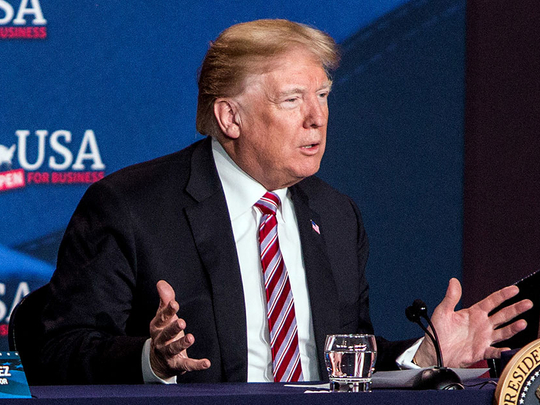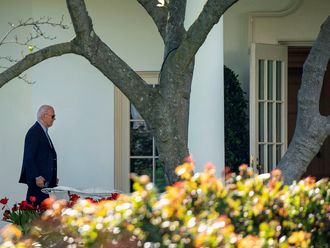
Washington: President Donald Trump rejected, for now at least, a fresh round of sanctions set to be imposed against Russia on Monday, a course change that underscored the schism between the president and his national security team.
The president’s ambassador to the United Nations, Nikki Haley, had announced Sunday that the administration would place sanctions on Russian companies found to be assisting Syria’s chemical weapons programme. The sanctions were listed on a menu of further government options after a US-led air strike on Syria, retaliating against a suspected gas attack that killed dozens a week earlier.
But the White House contradicted her on Monday, saying that Trump had not approved additional measures.
“We are considering additional sanctions on Russia and a decision will be made in the near future,” Sarah Huckabee Sanders, the White House press secretary, said in a statement.
Speaking later with reporters aboard Air Force One as Trump headed to Florida, Sanders added that “the president has been clear that he’s going to be tough on Russia, but at the same time he’d still like to have a good relationship with them.”
Another White House official, who spoke on condition of anonymity to describe internal deliberations, said Trump had decided not to go forward with the sanctions. Trump concluded that they were unnecessary because Moscow’s response to the air strike was mainly bluster, the official said.
Russia analysts said the whipsaw policy shift once again highlighted an administration struggling to find a coherent and consistent voice in dealing with Russia, which in the past four years has annexed Crimea, intervened in eastern Ukraine, sought to influence the US election in 2016, allegedly poisoned a former Russian spy living in Britain and propped up the murderous government of President Bashar Assad in Syria.
Trump has mostly spoken hopefully of his efforts to forge a friendship with President Vladimir Putin of Russia, including congratulating him on a re-election widely denounced as a sham and even suggesting a White House meeting. At the same time, the Trump administration has imposed two rounds of sanctions against Russia in the last month, expelled 60 of Moscow’s diplomats and closed a consulate in retaliation for the poisoning attack in Britain.
“Trump seems to think that if he accepts what his advisers recommend on even days of the month and rejects their recommendations on odd days, the result will be a strategy,” said Stephen Sestanovich, a scholar at the Council on Foreign Relations and Columbia University who served as ambassador to former Soviet states in the 1990s.
“By and large, other governments don’t know whether to laugh or cry at all this,” Sestanovich said. “But in Russia, laughter is getting the upper hand.”
Trump was annoyed with Haley for getting out in front of the policy, the administration official said, and the president’s decision to reject sanctions left her hanging in public with her credibility on the line.
Haley has been one of the strongest critics in the administration of Russia’s behaviour around the world, often speaking far more harshly than Trump would, but she has rarely been reined in publicly this way. She made no comment on Monday.
Administration officials said new sanctions could be imposed at some point if Russia takes further action justifying them.
But absent such a scenario, the officials could not explain how Trump would make Russia pay a “big price” for enabling Syria’s use of chemical weapons, as he promised to do last week after a suspected gas attack killed more than 40 people and sickened scores more outside Damascus on April 7.
The strike against Syria that Trump announced late Friday in Washington was limited to a single night and to three targets linked to chemical weapons facilities. It sought to punish Assad for the suspected gas attack but avoid provoking Russia into a response.
Russian forces stationed in Syria have helped Assad gain the upper hand in the country’s seven-year civil war.
Russia responded harshly to the news of sanctions before learning that Trump had cancelled them. “The sanctions drive against Russia is becoming an obsession,” Dmitry S. Peskov, the Kremlin spokesman, told reporters at his daily briefing in Moscow. “We’re convinced that any economist can see open attempts to squeeze Russian companies out of global markets.”
Critics said the president’s decision not to follow through on Haley’s announcement would sap US authority around the world.
“I am outraged that President Trump pulled back sanctions on Russia for its support of the Assad regime,” said Rep. Eliot L. Engel of New York, the senior Democrat on the House Foreign Affairs Committee. “This sends a message to governments around the world that they can support brutal, criminal behaviour without serious consequences.
“President Trump is out of step with the American people, American values — and as this situation has made clear, his own administration,” Engel said.
In hitting the Barzah Research and Development Center, a chemical weapons research lab in greater Damascus, and two storage facilities and bunkers near Homs, Pentagon officials insisted that they dealt a critical blow to Assad’s weapons programme. Friday night’s strike, delivered via 105 missiles, was not quite double the 59 missiles used last year when Trump ordered the military to strike a Syrian airfield from which planes engaged in another chemical weapons attack took off.
Defence Secretary Jim Mattis pushed hard to limit the strikes to proven weapons facilities in the hopes that a more limited strike would not prompt retaliation from Russia.
The lab at Barzah, in Damascus, was on the receiving end of the biggest barrage — some 76 missiles, a combination of Tomahawk cruise missiles and Joint air-to-surface missiles. The rest of the bombs — 29, fired by US, French and British warplanes — struck and destroyed the Him Shinshar chemical weapons storage facility near Homs, and the Him Shinshar chemical weapons bunker facility about 5 miles away.












